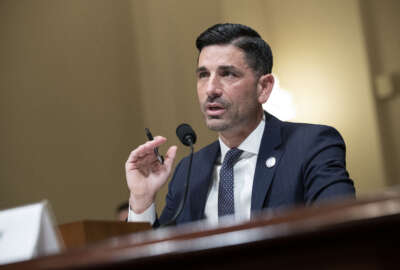
Coronavirus could upend feds’ work travel plans
For thousands of federal employees for whom travel is a part of the job, the coronavirus is a new threat.
Best listening experience is on Chrome, Firefox or Safari. Subscribe to Federal Drive’s daily audio interviews on Apple Podcasts or PodcastOne.
For thousands of federal employees, travel is a part of the job. Now, thanks to the coronavirus threat travel, with its crowded airports and filthy planes, isn’t looking like such a good idea. Can feds say, “no”? Federal employment practice attorney Lynne Bernabei, of Bernabei & Kabat, joined Federal Drive with Tom Temin for some answers.
Interview transcript:
Tom Temin: Lynne, good to have you back.
Lynne Bernabei: Good morning, good to speak to you.
Tom Temin: People that are worried about travel for official duties, can they actually say, “No. I don’t want to do that because I’m worried about coronavirus”?
Lynne Bernabei: It depends. It’s a complicated answer. If your job duties require travel — and now we’re just talking about general travel, not to particularly dangerous areas with infected individuals — the answer’s yes, they can force you to travel. If you’re going into someplace where you will come in contact with infected individuals or likely to, for example, medical workers or even maintenance workers, some scientific employees who are dealing with specimens, then you can say the agency has to follow proper protocols, which are set up in most agencies.
Tom Temin: I would imagine the medically related agencies like FDA or CDC people would expect to be going to the hot zones in the first place. But what is it that the agency must do for them, even if it’s part of the job to go to those specific areas?
Lynne Bernabei: Well, there’s protocols that have been established. And if there’s no protocols, there’s two places to look. One, the AFGE, American Federation of Government Employees — the largest government employee union — they have many collective bargaining agreements that put in place appropriate protections for the federal workers they cover. And OSHA also has put out a fact sheet, Occupational Health and Safety Administration. And that explains to federal workers what they have to do. What they don’t do, what they can require of their agency in a pandemic situation. It’s actually very good at explaining very simply, you know, what you could do to protect yourself.
Tom Temin: And so basically, then you’ve got to go. Now suppose you’re in a scientific agency and there’s a big scientific meeting, and you’re going to present a paper, say, and that meeting might be in somewhere in the Asian countries or somewhere where you’re worried there might be some more outbreak than there is even as we’re seeing day by day in the United States?
Lynne Bernabei: Well, I think it’s sort of a matter of common sense, and, you know, I know that’s sort of in short supply these days. But, you know, I think many conferences in highly infected areas are being canceled, such as, certainly China, even Italy has canceled a lot of big public events. So I think that’s going to be less of an issue. I think the smaller conferences that may be held in highly infected areas, I think unless there’s a special health risk, I think there’s no reason to cancel your plans.
Tom Temin: So basically, then, it’s travel as normal. I guess you could say the instance of the airlines themselves canceling flights to certain areas — that could be a way out. I guess if you really didn’t want to go, you might be forced to stay home if you can’t get there.
Lynne Bernabei: Yes, I think that’s one issue, and I know the president has also instituted travel restrictions on a number of countries. And of course, you know, this is the first time that’s happened for a pandemic situation. So you know, it’s unclear how that’s going to affect things. I think in most instances people that aren’t health care workers, aren’t maintenance workers, aren’t people that handle specimens of medical waste, those kinds of people, I think they’re gonna find that their events are canceled. And there’s, you know — I don’t think that’s going to be a huge problem, at least if this really takes hold the way that it may take hold.
Tom Temin: We’re speaking with Lynne Bernabei. She’s a federal practice attorney with Bernabei & Kabat. And what kinds of things have you been seeing otherwise in the workplace these days, either related to the coronavirus or just general crabbiness?
Lynne Bernabei: Well, I think, unfortunately, this administration doesn’t value federal workers whether they be in the State Department, HHS, CDC. And there’s been, certainly, you know, for the nondefense-related agencies there’s been a reduction in funds, which in turn means that it’s becoming much more attractive for senior experienced people to leave, and they are leaving. And I think that’s one of the issues, even with the coronavirus, that the experienced people are leaving the agency. Tthe spot in the White House that was for sort of a czar to take care of any pandemic issues such as we’re facing now are has been destroyed. In fact John Bolton was the one that destroyed it. So, there’s big pockets in the government that are no longer there to protect people. So I think, you know, the other people left in the federal government are very frustrated and unhappy.
Tom Temin: Well, getting back to this whole coronavirus issue, I mean, what do you counsel management to do if people are saying,”Yes, I have to travel, and it’s part of the job.” But should they be a little bit more flexible right now if people just don’t feel like going in mixing up with people in airplanes and trains and airports?
Lynne Bernabei: I think definitely, in fact, the EEOC has also put out guidelines, and I think flexibility is especially important with people who may have some health conditions, who are disabled. And what OSHA and the EEOC recommend is that employers be especially observant or ask more questions about medical conditions. Not that they can share the information, but for their own management responsibilities, and see if there’s some special reason that someone might be more vulnerable to the virus than others. And in those circumstances they are required to accommodate by allowing telework, allowing people to work from home — what they call “social distancing.” So they are required under the Americans with Disabilities Act, and just in terms of good management practices to let people work from home if they feel they have a special health condition that would make them particularly vulnerable.
Tom Temin: Yes, that’s a little bit ironic, too, because the Trump administration, at least through Social Security and several other agencies, have been trying to really cut back on telework. That had been trending upward for a number of years. Seems like this could give fresh boost to the people in favor of telework generally, governmentwide.
Lynne Bernabei: Oh, absolutely. I mean, telework if not abused, and there are instances, of course, when it’s abused like everything else, but, can be very efficient for the government. I mean, people have long commuting times now in many areas because of the cost of housing in the District of Columbia, and so that could be an efficient method for having people have more working hours and keeping good workers. I think you’re right, it may very well have anew lease on life.
Tom Temin: All right, well, let’s hope the whole thing blows over at least the coronavirus. We can get back to the regular issues. Lynne Bernabei is a federal employment practice attorney with Bernabei & Kabat. Thanks so much.
Lynne Bernabei: Thank you.
Tom Temin: We’ll post this interview at www.federalnewsnetwork.com/FederalDrive. Hear the Federal Drive on your schedule. Subscribe at Apple Podcasts or Podcastone.
Copyright © 2025 Federal News Network. All rights reserved. This website is not intended for users located within the European Economic Area.




